JB petrol kiosks on ‘high alert’ for foreign vehicles pumping subsidised RON95 fuel amid larger fines of over RM1 million
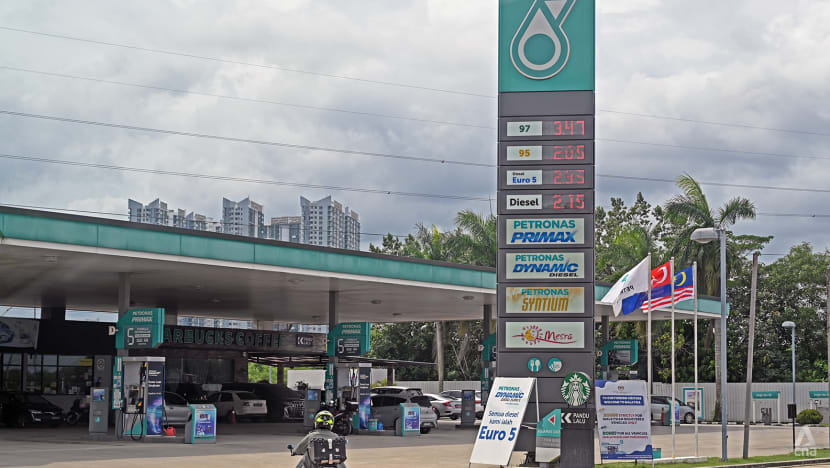
A general view of a petrol station in Johor Bahru, January 16 2024. (Photo: CNA/Zamzahuri Abas)

This audio is generated by an AI tool.
- The Malaysia government announced recently that premises which allow the illegal sale of subsidised petrol could receive fines exceeding the RM1 million limit
- Higher fines and promise of more enforcement checks have forced petrol kiosk operators to step up monitoring efforts in hotspot areas like Johor Bahru
- Petrol industry players are urging the government to impose fines on errant motorists as they are partially to be blamed
JOHOR BAHRU: Johorean Mohammad Syafik Mohammad manages one of the busiest petrol kiosks in the country.
The Petronas station situated along the road exiting from the Bangunan Sultan Iskandar customs, immigration and quarantine complex (BSI) linked to the Woodlands Causeway sees more than 400 vehicles passing through daily.
“We are on guard all the time because there will always be some who are willing to try their luck,” said the 30-year-old during an interview with CNA, referring to motorists of Singapore-registered vehicles who persist in illegally filling up with RON95 fuel.
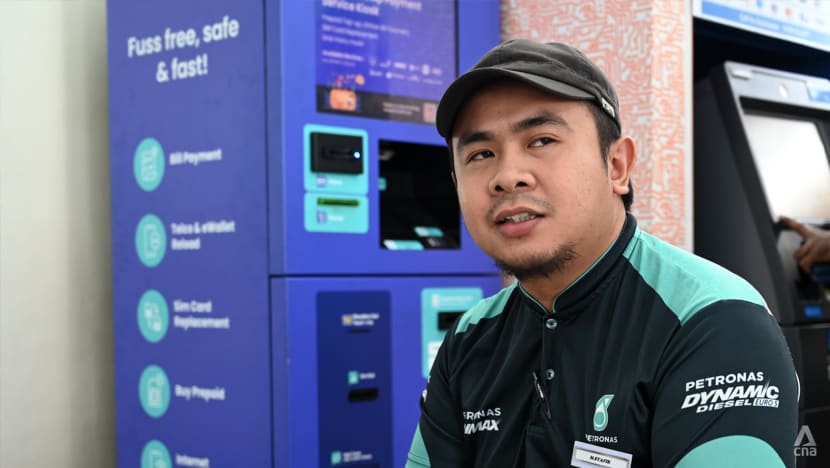
“In spite of our best efforts to stop them before they insert the nozzle into their vehicles, every month there will be three or four who do so. We take down their particulars and inform the authorities,” he added.
Since August 2010, Malaysia has banned the sale of RON95 petrol to foreign-registered vehicles. The fuel type is partially subsidised by the government and is meant to benefit Malaysians.
But on Monday (Jan 15), the Minister of Domestic Trade and Cost of Living Minister Armizan Mohd Ali said fuel station operators who are found guilty for the first time could soon face fines exceeding the existing RM1 million (US$211,976), adding further pressure on the industry.
He stressed that the hike in fines is part of the government’s effort to counter “leakages” involving subsidised fuel.
The sale of subsidised petrol to foreign-registered vehicles is an offence under the Control of Supplies Act 1961. Before the Jan 15 announcement, petrol kiosk operators found guilty of breaching this law risked fines of up to RM1 million (US$211,976) for the first offence and for subsequent offences, up to RM3 million, jail time for up to three years, or both,
Currently, there is no law saying that fines will be imposed on errant motorists.
This has led to complaints from some industry players who suggest that drivers should also be imposed fines for fuelling up illegally as many do so in full knowledge of the law.
Petrol stations in Malaysia are largely self-service. Motorists are able to swipe their credit cards at the kiosks and fuel up petrol into their own vehicles by inserting the nozzles themselves.
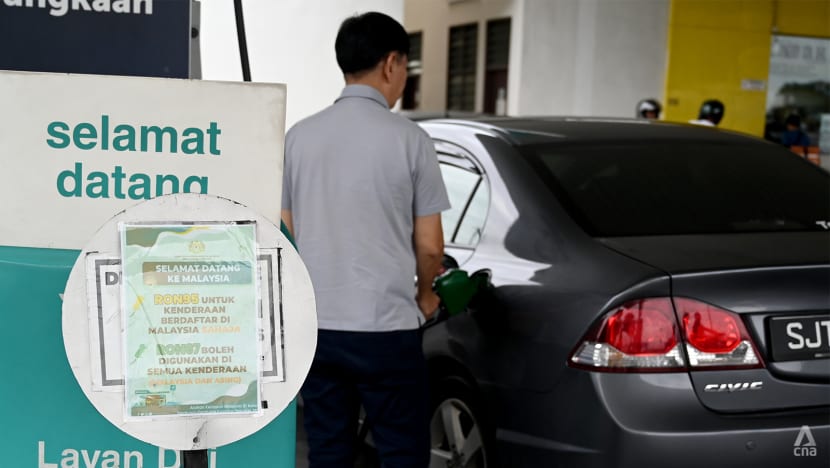
Petrol kiosk operators in Johor Bahru who spoke to CNA said that they are stepping up monitoring efforts in their respective fuel stations by increasing the intensity of checks on site.
Mr Mohammad Syafik told CNA that following this latest development by the government, petrol stations especially in the Johor Bahru area are on “high alert” to ensure that all motorists do not flout the rules.
“Since the announcement last Monday … we have our staff members patrolling the petrol islands to ensure no motorist with a Singapore vehicle picks up the yellow nozzles (RON95 fuel),” he said.
“We cannot take any chances. If we get caught, who is going to pay the fine?” added Mr Mohammad Syafik.
GOVERNMENT TO INTENSIFY ENFORCEMENT OPERATIONS
In response to queries from CNA, the Johor division of Malaysia’s Domestic Trade and Consumer Affairs Ministry (KPDN) said that on the back of minister Armizan’s comments that harsher penalties may be imposed on petrol operators who sell subsidised petrol to foreign registered vehicles, the department will “step up enforcement operations” at petrol kiosks in the state.
The division spokesperson told CNA that in 2023, 200 officers were deployed across 4,000 checks at petrol kiosks close to the Johor border with Singapore.
“We will continue to monitor the issue closely and ensure that the law is upheld,” the spokesperson said, adding that even more raids and operations will be conducted in 2024.
The spokesperson added that between 2022 and 2023, the division issued a total of 26 compounds to errant petrol kiosk operations amounting to RM30,600.
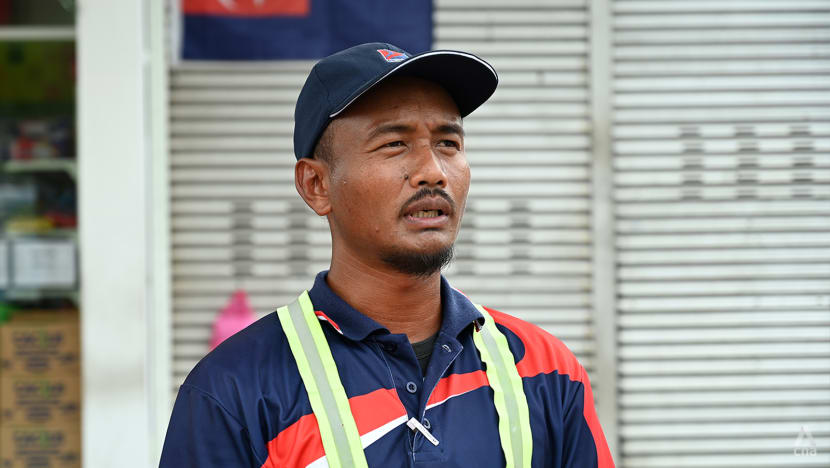
Mr Latif Rashid, a pump attendant at a Petron kiosk along Jalan Yahya Awal, located a five-minute drive from BSI, told CNA that in recent days, he noticed that the KPDN officers have increased the number of enforcement checks on his kiosk.
“There was one day last week where they came twice in a day, once in the morning and then again in the evening. It's of course not pleasant because our staff will have to be on standby to be doubly sure no one is breaking the law in our kiosk,” said Mr Latif.
Mr Faisal Abdul Rahman, who manages operations at a Shell Station along Jalan Yahya Awal echoed similar sentiments and told CNA that his colleagues get “nervous.”
“Over the last week, the KPDN officers are here more often than usual. Even though we ensure that no rules are broken, it's still tricky because we are double and triple-checking to ensure that we are not breaking the law. The risk of being fined is too heavy,” he added.
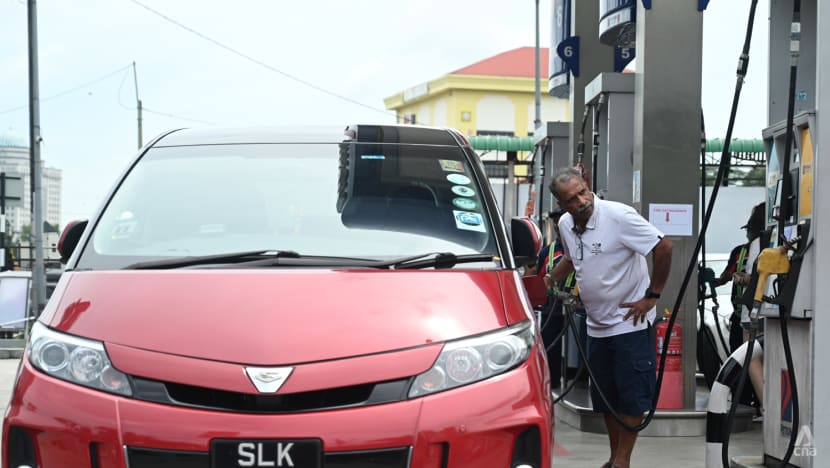
The development is thought to be part of Prime Minister Anwar Ibrahim's government’s overall strategy to streamline government subsidies to those who are in need, to reduce national debt.
“These are some of the areas that we are looking into. Further discussions will be made before we firm things up,” he was quoted as saying by The Star.
The government has been cracking down on the issue over the past year. In March 2023, a petrol station owner in Johor Bahru was fined RM40,000 for allowing a Singapore-registered vehicle to fill up 54 litres of RON95 petrol worth RM113.30.
CONSTANT MONITORING PRESENTS CHALLENGES
Petrol kiosk operators, especially those situated in hotspots near the Causeway, told CNA that the manpower and resources needed to “constantly monitor” the kiosks to ensure that motorists do not flout the rules is a challenge.
Mr Faisal, who has worked at the station for four years, said: “This week we were warned by higher-ups that the government said it will increase fines on petrol operators if there are cases of foreign cars refuelling with RON95. I am on guard to ensure it does not happen on my watch.”
“We have signs put up that warn motorists not to fill up with the wrong fuel grade and we do physical checks ourselves to ensure they do not lift the wrong nozzles. Most of the Singapore vehicles are known to fill up with RON97 or VPower (the permitted fuel types) but some still would try their luck and go for the RON95.
"They would park at petrol islands located far from the cashier in the hope that no one catches them,” he added, specifying that this would happen around twice a week.
Mr Faisal said that more members of staff have to be rostered to monitor at the petrol islands, which is difficult given that the kiosk is open 24 hours.
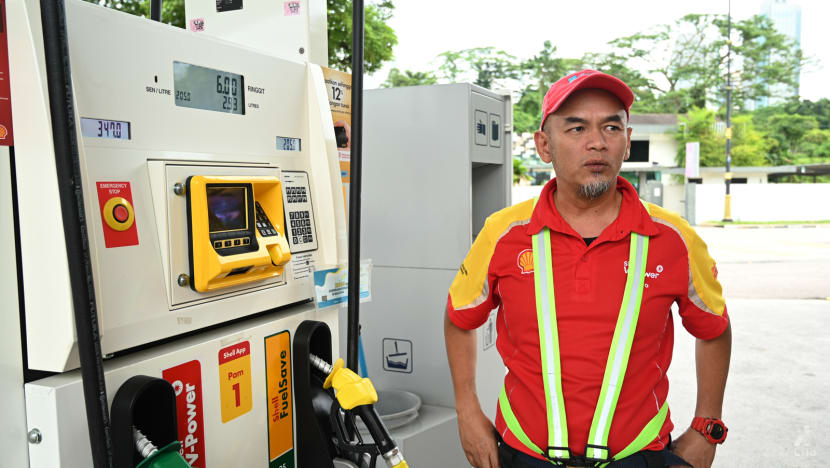
“In terms of manpower we are stretched thin already so … this is more difficult,” he added.
Singaporeans who drive to Johor Bahru for leisure activities like shopping, golf and vacations would typically fuel up before returning home due to the large disparity in cost of petrol between the two countries.
Based on prices listed as of Jan 18, the cost of RON95 fuel in Singapore is roughly S$2.83 (RM9.93) per litre. Meanwhile, RON95 in Malaysia is priced at around RM2.05 per litre, more than three times cheaper.
RON97, which is permitted for Singapore motorists to fuel up within Malaysia, is priced at RM3.47 per litre in Malaysia while RON98, the most similar type of fuel grade available in Singapore, costs S$3.30 (RM11.57) per litre.
CNA visited six petrol kiosks in Johor Bahru across Jan 16 and 17 and did not see any Singapore-registered vehicles fuelling up on RON95.
The Singaporean motorists CNA spoke to said that they were aware of the law on RON95 and would not attempt to flout it.
However, some pump attendants said that errant motorists would resort to underhand methods to save some money.
Mr Latif Rashid told CNA that he has seen motorists illegally filling up with RON95, attempting to block the nozzles from view.
“They would ask their fellow passengers to stand around the nozzles and pretend to be having a conversation,” he added.
“It is challenging because it is our job to catch them before they attempt to insert the nozzles, and during a busy day especially during weekends, it's almost impossible to ensure each and every motorist adheres to the law,” said Mr Latif.
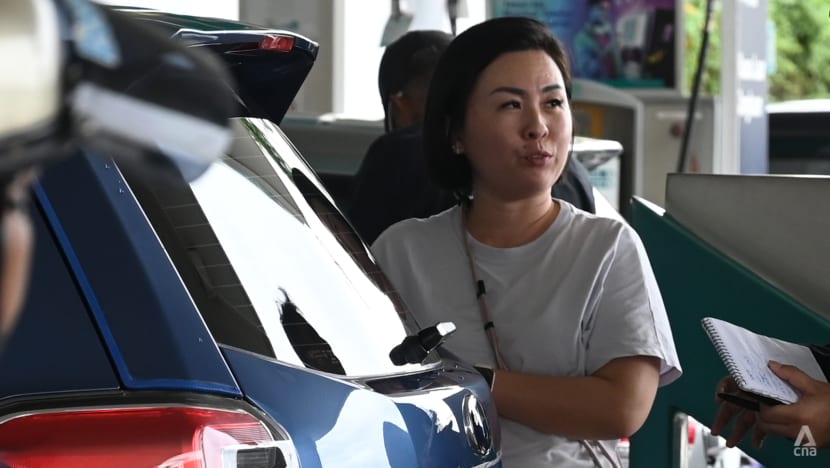
Petrol Dealers Association of Malaysia (PDAM) president Khairul Annuar Abdul Aziz told CNA in a phone interview that fuel station operators risk sacrificing profitability if they are required to hire more manpower for monitoring.
“At some highway petrol kiosks, there are 10 petrol islands with 20 filling bays. We just can’t have one worker per petrol island at any one point,” said Mr Khairul Annuar.
“So if (the government) wants us to enforce, it's very difficult. We can’t just be hiring more and more people. At a certain point, we will no longer become profitable,” he added.
Clips of foreign-registered vehicles, typical of those from Singapore and Thailand, illegally filling up with RON95 have also gone viral on social media recently, with Malaysia netizens lauding the effort to call out these errant motorists.
A clip posted on social media platform X by user @bitcoinmalaya on Jan 10 showed a motorist of a Singapore-registered car fuelling up on RON95 at an undisclosed Petronas kiosk in Malaysia. The person filming the incident is heard calling out to the motorist to inform him that he was filling up with the wrong petrol grade but his pleas are ignored by the motorist.
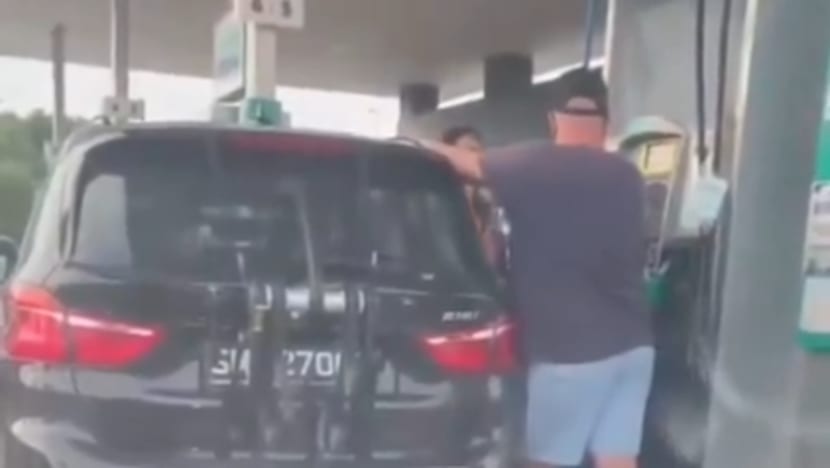
The clip has garnered more than 1.2 million views.
Some petrol kiosks are resorting to technology to ensure that foreign motorists are unable to access RON95 petrol.
Mr Faisal told CNA that his team has a “special mechanism” that would recognise a foreign licence plate and halt the flow of RON95 petrol to the vehicle.
“There are petrol islands which only offer RON95 petrol grade. So when a Singapore-registered car or motorcycle pulls up to these petrol islands, the system halts the flow of RON95 petrol and the motorist will be unable to dispense any fuel,” he added.
“After inserting their credit card, they will be left confused as to why there is no petrol being dispensed and will be forced to report to the counter,” said Mr Latif.
FOREIGNERS WHO FLOUT RULES MUST BE FINED TOO: INDUSTRY PLAYERS
Petrol operators who spoke to CNA suggested that the laws be tweaked so that motorists who illegally fill up on RON95 would also be fined for their indiscretions.
PDAM’s Mr Khairul Annuar told CNA that it was unjust that petrol operators should take the full blame as in his opinion, some motorists bend the rules in their favour.
“Maybe Malaysia is too hospitable. After COVID-19 we want to encourage tourists to come back and don’t want to issue fines to them, but then when the government cracks down on this issue, petrol operators get fined in huge amounts,” said Mr Khairul Annuar.
“One time we are fined, we can be bankrupt,” he added.
Mr Khairul Annuar added that PDAM has made suggestions to KPDN that the government impose fines on drivers of foreign-registered vehicles who knowingly fill up RON95 petrol illegally.
He suggested that KPDN work with the police and the public works department to synchronise fines into a single system, so that the errant motorists are forced to pay the summons whenever travelling through the border checkpoints.
“This is similar to the system Singapore has. Drivers of Malaysia-registered cars who are imposed summons will have to settle their fines before they return home at the checkpoint,” Mr Khairul Annuar said.
Mr Faisal agreed that errant motorists must also shoulder some of the blame.
“I think it’s only fair. When KPDN do enforcement checks we the petrol operators are the target of the summons but in the cases I’ve seen, motorists are the ones committing the offences,” he added.
However, moving forward to the second half of 2024, the fuel industry in Malaysia is likely to see major changes even for Malaysian motorists. Economy Minister Rafizi Ramli announced in November 2023 that the government is coming up with a mechanism to ensure that RON95 subsidised petrol will only be available to targeted members of the population based on their income needs.
Mr Rafizi said presently, those in the top 20 (T20) income group are receiving 53 per cent of blanket fuel subsidies and that this is not a sustainable nor equitable model.
PDAM’s Khairul Annuar said that this is set to alter the way RON95 becomes accessible to the masses, and perhaps only those with a specific card or QR code will be able to fuel up with it.
“The mechanisms have not been finalised yet but hopefully it will put an end to this issue of those owning foreign-registered cars filling up (with RON95) illegally,” he said.
“Everybody will be buying petrol they qualify for at the right market price and this problem we are facing now will just be a short-term thing,” added Mr Khairul Annuar.
















